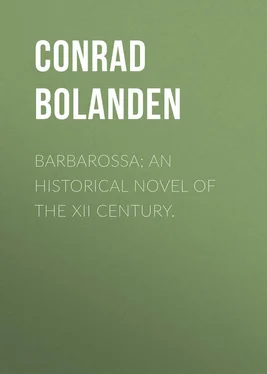Conrad Bolanden - Barbarossa; An Historical Novel of the XII Century.
Здесь есть возможность читать онлайн «Conrad Bolanden - Barbarossa; An Historical Novel of the XII Century.» — ознакомительный отрывок электронной книги совершенно бесплатно, а после прочтения отрывка купить полную версию. В некоторых случаях можно слушать аудио, скачать через торрент в формате fb2 и присутствует краткое содержание. Жанр: foreign_antique, foreign_prose, Историческая проза, на английском языке. Описание произведения, (предисловие) а так же отзывы посетителей доступны на портале библиотеки ЛибКат.
- Название:Barbarossa; An Historical Novel of the XII Century.
- Автор:
- Жанр:
- Год:неизвестен
- ISBN:нет данных
- Рейтинг книги:5 / 5. Голосов: 1
-
Избранное:Добавить в избранное
- Отзывы:
-
Ваша оценка:
- 100
- 1
- 2
- 3
- 4
- 5
Barbarossa; An Historical Novel of the XII Century.: краткое содержание, описание и аннотация
Предлагаем к чтению аннотацию, описание, краткое содержание или предисловие (зависит от того, что написал сам автор книги «Barbarossa; An Historical Novel of the XII Century.»). Если вы не нашли необходимую информацию о книге — напишите в комментариях, мы постараемся отыскать её.
Barbarossa; An Historical Novel of the XII Century. — читать онлайн ознакомительный отрывок
Ниже представлен текст книги, разбитый по страницам. Система сохранения места последней прочитанной страницы, позволяет с удобством читать онлайн бесплатно книгу «Barbarossa; An Historical Novel of the XII Century.», без необходимости каждый раз заново искать на чём Вы остановились. Поставьте закладку, и сможете в любой момент перейти на страницу, на которой закончили чтение.
Интервал:
Закладка:
"'The Church is our common Mother, the source and origin of all light and vitality. It is on this account that all emperors and kings, princes and archbishops, bishops and prelates, are her vassals. Thanks to the power of the Apostolic keys, she can make and unmake them, for the power which she delegates is not for a passing fame, but for a holy eternity. To her, then, they all owe a respectful and modest obedience.'"
Until then, the Emperor had listened in silence, although his features betrayed the violent emotions of his inner self. Suddenly interrupting the Chancellor, he exclaimed, -
"By my faith, the reasoning is highly logical! The Church rules all! She can make and depose both emperors and princes! – All must passively obey her mandates! – What arrogance! – Princes are naught but simple vassals of the Pope!"
"Absolutely nothing else," replied Rinaldo; "the Pope is the sun, the Emperor the moon, who receives from His Holiness light and brilliancy and power."
"Enough! enough!" cried Frederic, angrily; "mark the place and close the book-the reading of such enormities is an insult to the Imperial dignity." A crafty smile played around the Chancellor's lips as he replied, -
"Great men, unluckily, make great blunders; but for your unfortunate oversight, no Pope would have ventured to make such an extravagant claim to universal sovereignty."
"Was it not the duty of Charles to defer to the request of Rome?"
"Most certainly! but his liberality to the Church might have been more measured, and the honors conceded more judiciously denned. Hold the Pope's stirrup! – yes, the Emperor must even stoop to that-although it is, in reality, a mere idle form," added the Chancellor, hurriedly, as Frederic's face colored up. "Surely none can blame the Popes if they construe what was a mere form into an obligation of importance."
"When I held the stirrup of His Holiness, my lord Chancellor," said Barbarossa with great dignity, "it was the homage paid by a Christian to the chief of Christendom."
"A most excellent reason, Sire," replied the Chancellor, in an insinuating tone. "The fulfilment of a Christian's religious duties can but honor an Emperor. But I have yet to learn in what way those duties interfere with the prerogatives of a Sovereign."
"Well! – you would elevate then the monarch's rights above the Christian's responsibilities?"
The smiling glance of the statesman dwelt for an instant upon his sovereign, who had given his minister to understand that he regarded his opinions as somewhat heretical and very difficult of realization. Barbarossa was willing to admit, to a certain extent, the superiority of the temporal over the spiritual power, but he still hesitated before the impiety of claiming the supremacy.
"Although you may place the Emperor above the Christian," resumed the Chancellor, "you will not on that account cease to be one. I will say even more: to reign, truly, the separation of the Empire from the Papacy is a necessity. Look towards the monarchs of France and Saxony; for them the Pope has never been anything more than the Bishop of Rome, chosen from among the most worthy prelates. They were the temporal masters of the Roman Pontiff, although ever the first to honor him as the Head of the Church. And what, to-day, is the Papal supremacy over the Emperor, what is his influence? You selected Victor as Sovereign Pontiff, while the College of Cardinals elected Roland, who, under the title of Alexander III., reigns in spite of you! Victor, the feeble creation of your own hands, will fall as soon as your support be withdrawn, while Alexander, your triumphant adversary, is seated more firmly than ever upon the throne of St. Peter. His legates, only, are received in Spain, in France, in England; they only are acknowledged throughout the civilized world!"
"Enough of this!" said Frederic. "To what end serves your discourse? It is but a waste of time to prove to me, now, that during the past two years we have plotted, and toiled, and fought in vain."
"In vain! Sire! – but why? Because you neglected the golden opportunity! Milan, the bulwark of Alexander's power, was in your hands; you should have levelled her to the ground!"
"Always ready, my lord, to tell me what should have been done! Why was not this advice offered sooner?"
"It is not yet too late," replied Rinaldo. "The German bands have passed the Alps; let their first exploit be the capture of Milan."
"Naturally; and their second?"
"The overthrow of the present status of Italy, and the installation of Victor at Rome."
"And then the heretic Barbarossa, the persecutor of the Holy Church, will be put under the ban of the Universe!" replied Frederic, with a bitter laugh.
"Heretic? No! But the astonished world will hail in you the worthy rival of the great Emperor. What did Charlemagne, and Otho, and Henry III. do? Did they not give Rome to the Popes? And if you, their successor, should place in Rome a bishop of your own selection, who could dispute your authority? Act, break down all opposition, and the Papacy, henceforward, will be no more the enemy, but the obedient vassal of the Germanic Empire." Whilst Rinaldo spoke, Barbarossa seemed lost in thought; every word of the crafty statesman produced its effect, for it answered the ambitious cravings of his own nature, which had long aimed at the subjection of the spiritual to the temporal power. Could his dreams be realized, the Emperor would reign supreme, and the Church, shorn of all her prerogatives, would remain, as she had existed during the dark ages, the source of all faith, but a mere fief of the Empire.
The difficulties of the undertaking did not escape him, but far from causing discouragement, they pleased him the more, by their bold and hazardous originality. Rinaldo, in silence, with folded arms and down-cast eyes, watched narrowly the effect produced on the Emperor by his discourse.
Suddenly Otho of Wittelsbach advanced hurriedly.
CHAPTER IV.
THE BATTLE
"Bad news! Sire," cried the Count Palatine. "Cinola, your strong fortress on the Adda, is in the hands of the enemy."
Barbarossa sprang to his feet, and gazed with surprise upon the Count.
"Cinola taken!" cried he angrily, – "when-by whom?"
"To-day, by the Milanese; but here is a man who will give full details to your Majesty."
And he pointed to a soldier who, until then, had stood at a short distance from the group.
"Ah! is that you, Gero?" said Frederic, whose extraordinary memory never forgot a name or a face. "Tell me at once, everything!"
"The tidings which I bring to your Majesty are most unfortunate. Cinola was, this morning, surrendered to the Milanese."
"Surrendered?" said the Emperor, angrily.
"Yes, Sire, – surrendered by the base Guelph, the traitor Bonello, to whom your Majesty had intrusted the command of the fortress."
The face of the Emperor grew black with rage.
"What is the strength of the Milanese?" he asked.
"About three hundred men."
"Have they burned the Castle?"
"I am ignorant of that fact, Sire! As soon as the banner of the Guelphs was hoisted over the citadel, I hastened hither. But some time must elapse before they can sack and burn the place, as their first visit will doubtless be to the wine-cellars."
"How many Germans were with you in the Castle?"
"Three and a half, your Majesty, – for one of them had lost a leg. Poor fellows! they are in a pitiable condition, for their lives are in danger!"
"Gentlemen," said the Emperor to his knights, who were grouped around him, "we must not lose an instant; this new outrage must be punished at once!"
The knights looked at each other with astonishment; and even the daring Otho shook his head.
"Sire!" said he, "the Guelphs are too much our superiors in numbers."
Читать дальшеИнтервал:
Закладка:
Похожие книги на «Barbarossa; An Historical Novel of the XII Century.»
Представляем Вашему вниманию похожие книги на «Barbarossa; An Historical Novel of the XII Century.» списком для выбора. Мы отобрали схожую по названию и смыслу литературу в надежде предоставить читателям больше вариантов отыскать новые, интересные, ещё непрочитанные произведения.
Обсуждение, отзывы о книге «Barbarossa; An Historical Novel of the XII Century.» и просто собственные мнения читателей. Оставьте ваши комментарии, напишите, что Вы думаете о произведении, его смысле или главных героях. Укажите что конкретно понравилось, а что нет, и почему Вы так считаете.












